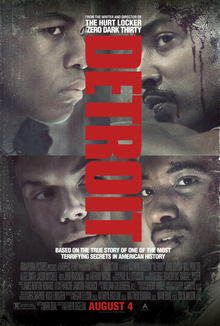In 1967 amid Detroit’s 12th Street Riots, police officers led by Phil Krauss (Will Poulter) descend upon the Algiers Motel in response to shots supposedly fired their way. In their attempt to identify the shooter, they subject the motel’s occupants – a returning Vietnam War veteran (Anthony Mackie), members of an R&B band (Algee Smith and Jacob Lattimore), and two white girls (Hannah Murray and Kaitlyn Dever) – to increasingly abusive and terrifying interrogations. Melvin Dismukes (John Boyega), a security guard, is uncomfortably caught in the middle.
Directed by Kathryn Bigelow and written by Mark Boal (the team behind Zero Dark Thirty), Detroit is a polarizing film both in terms of its treatment of history and its creators’ stylistic and narrative choices. What it does well it does exceedingly well, but that strength comes at the expense of nearly all else.
As should come as no surprise for fans of Bigelow’s work (see The Hurt Locker), Detroit is an extremely tense film. The film’s long, brutal interrogation sequence is unflinching, unglamorous, and uninterrupted by either music (arguably a waste of James Newton Howard’s talents) or Hollywoodized false hope. It grabs audiences and makes them feel as uncomfortable as the beleaguered motel patrons, a relevant and resonant move given contemporary worries about police tactics.
Unfortunately, this comes at the expense of diminishing both character development and the film’s conclusion. Poulter stands out as a rabid, paranoid, violent cop who is nevertheless assured that he is in the right, but other actors aren’t given enough to work with – it’s hard to build layers of character when most of your screen time calls for you to either casually drink or look scared. Moreover, because the motel scenes take up so much of the film’s nearly two and a half hour run time, the aftermath, which is supposed to make us feel the repercussions of the damage done, instead comes across as almost an afterthought. It simply pales compared to the dramatic crescendo that preceded it.
All of this makes Detroit an ambitious, admirable, yet frustratingly flawed and not particularly likeable film. It’s worth watching for its intensity, but one wishes it had broadened its focus.
7.5/10

No comments:
Post a Comment